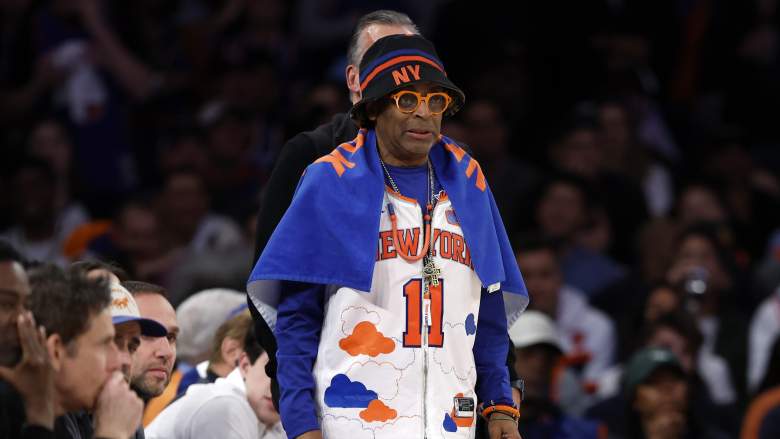
Spike Lee has always been more than just a filmmaker.
He’s a cultural touchstone, a lifelong New Yorker, and perhaps the most recognizable Knicks fan on the planet.
Whether he’s courtside at Madison Square Garden or behind the camera directing iconic films, Lee’s passion for basketball and storytelling remains undiminished.
His influence crosses generations, neighborhoods, and industries, earning him respect from athletes, directors, and activists alike. In a world that often moves fast and forgets its icons, Spike Lee remains a vital and ever-present voice.
On today’s episode of Scoop B Radio, Spike opened up about his all-time Knicks memories, the influence of He Got Game, the legacy of Anthony Mason and what still motivates him to create groundbreaking work today.
On His All-Time Knicks Starting Five — and the Game He’ll Never Forget

Talking about the Knicks with Spike Lee is like opening a door to history. You can feel the years of memories pouring out with each name, each moment, each heartbreak.
When it comes to picking an all-time Knicks starting five, though, Spike isn’t about to get boxed in by lists. Instead, he chooses to focus on something more emotional: the ultimate high, a night that defined a generation of Knicks fandom.
Sometimes, one memory says more than any lineup could ever capture. “I can tell you my greatest Knick game — May 8, 1970,” said Lee while on this week’s episode of Scoop B Radio.
“The Willis Reed and Walt ‘Clyde’ Frazier game. Game 7. I was 13 years old and I got to see the Knicks win their first championship.”
It’s not just a memory for Spike — it’s a personal milestone, a time when his love for basketball and New York intertwined forever.
That night still lives vividly in his heart, a moment untouched by time or disappointment.
On Crooklyn and Growing Up in the Garden’s “Blue Seats”

For Spike, Crooklyn wasn’t just a movie; it was a love letter to his youth. The sights, sounds, and spirit of Brooklyn in the 1970s run through every frame. And like so many kids growing up in the city, a night at Madison Square Garden — even way up in the “blues” — was a dream come true.
It wasn’t about where you sat; it was about being there, soaking in the magic of Knicks basketball.
Before Spike Lee the icon, there was Spike Lee the teenage kid, running toward his future with a MetroCard and a dream.
“Well, Crooklyn is autobiographical of our family growing up in Brooklyn in Fort Greene during the 70’s,” he said.
“So when I used to come to The Garden, I’m up in the blues. I’m happy to be there! And then I got my [first] season tickets for Patrick Ewing’s rookie year. So when Dave DeBusschere pulled out that card, and it said the Knicks, I ran to the subway and slept outside so I could be one of the first people in line.”
Spike’s journey from the upper decks to the front row mirrors the rise of New York itself — a story of hustle, hope, and never forgetting where you came from.
That same loyalty still burns every time he steps into the Garden.
On Decades of Knicks Heartbreak

For every soaring moment of Knicks glory, there have been years of pain.
The drought since 1973 has tested even the most die-hard fans’ patience and loyalty.
Yet there’s a badge of honor in standing by your team, no matter how rough the road becomes.
Spike wears that badge proudly, joking about the shared suffering that bonds generations of Knicks faithful.
Pain, after all, can sometimes be the strongest form of love.
“You haven’t been suffering not as long as me,” joked Lee.
“I’m old! Way older than you, my brother! We haven’t won a championship since the ‘72-’73 season. That’s over FIVE decades!”
It’s not just about waiting for a title — it’s about believing even when the odds say you shouldn’t.
And for Spike, that’s the essence of being a New Yorker.
On the 1994 Finals, the Rockets, and the O.J. Chase

Every Knicks fan remembers 1994, but maybe not for the reasons they’d like.
It was supposed to be a coronation, a return to championship glory against the Houston Rockets.
Instead, the infamous O.J. Simpson chase during Game 5 of the 1994 NBA Finals dominated headlines, stealing focus from what should have been a pure basketball moment.
For Spike, who was in the building that night, the surreal collision of sports and real-world drama is impossible to forget.
Even all these years later, the pain of what might have been still lingers.
“Don’t bring that up,” he said.
“I was at the game. Back then they had TV screens where the writers and the word got around. But that’s not — the game was… we could’ve won it. We had Game 6 and then you know what happened in Game 7.”
Spike’s voice trails off, as if the memory still aches.
Sometimes, the hardest losses are the ones that stay unfinished in your mind.
On Anthony Mason and His Modern NBA Comparison

If you ever watched the late Anthony Mason patrol the paint in the 90s, you know he wasn’t just tough — he was an attitude.
Mason played every game like it was a street fight, blending skill with raw power in a way few players could match. In today’s NBA, where versatility and toughness are prized more than ever, his legacy looms large.
When asked who reminds him most of Mason today, Spike didn’t have to think long.
There’s one player who carries that same edge — and it’s no surprise who came to mind.
“God rest his soul,” Lee said of Mason who died in 2015.
After pondering who in today’s NBA reminds him of Mason, only one name came to mind. “Draymond,” he said.
“Mase in Ya Face!”
Mason may be gone, but his spirit lives on in players who refuse to back down.
Draymond Green, like Mason, proves that toughness and smarts can still move mountains.
On He Got Game, Jesus Shuttlesworth, and Stephon Marbury

He Got Game wasn’t just a basketball movie; it was a story about fathers, sons, dreams, and choices. For years, rumors floated that Stephon Marbury was supposed to star as Jesus Shuttlesworth.
But Spike, who cherishes authenticity in his storytelling, knew what he wanted for the role. It wasn’t about celebrity — it was about telling a universal story through a fresh face. Choosing Ray Allen helped the film capture something pure, something enduring.
“The role was NOT him,” said Lee of Marbury.
“I love my brother, but it was not him. It was random. It’s a father/son relationship story and I chose Abraham Lincoln High School because at the time, they were the best public school basketball team here in New York City. So me and Stephon are cool and that movie is way past.”
The result was a movie that still resonates today, proving that the best art often comes from gut instinct.
Spike trusted the story, and generations of fans are better for it.
On Finding Inspiration in Today’s Climate

Spike Lee has never been shy about speaking truth to power. His films have long served as mirrors to America’s promises, failures, and possibilities.
In today’s turbulent climate, it would be easy for any artist to feel overwhelmed by the chaos.
But Spike still sees opportunity — the opportunity to tell stories that matter, to inspire, to provoke.
Even after decades of success, the fire to create burns as hot as ever.
“In this environment? There’s a whole lot of stuff! I’ll leave it at that!”
You don’t have to push much to know that Spike has a lot on his mind. And knowing Spike Lee, he’ll find a way to say it when the time is right — in a way that only he can.
Whether it’s filmmaking, fandom, or fighting for what’s right, Spike Lee’s passion continues to inspire — both in Madison Square Garden and far beyond.
And if history is any guide, The Iceman of New York City is far from finished writing his next chapter.

